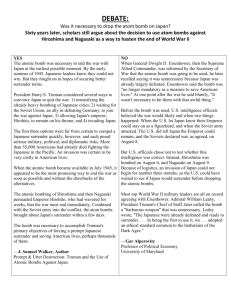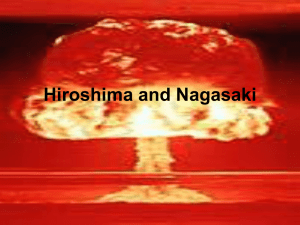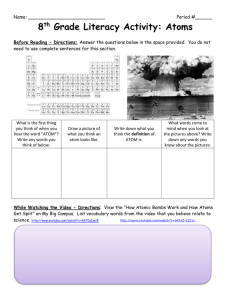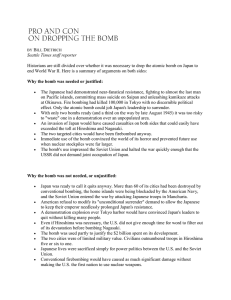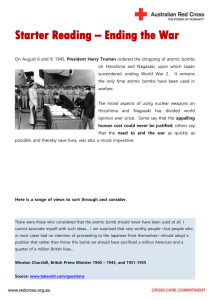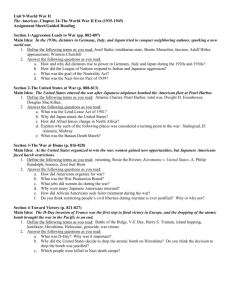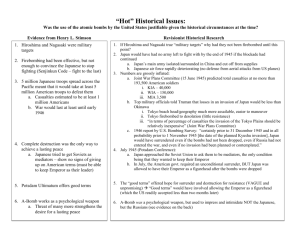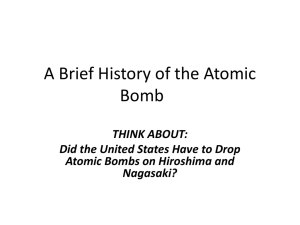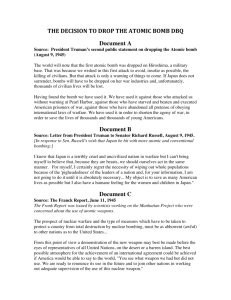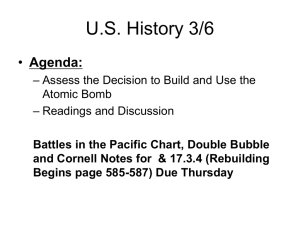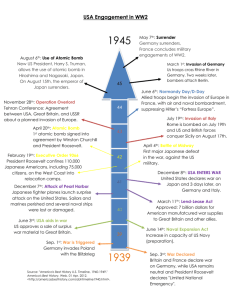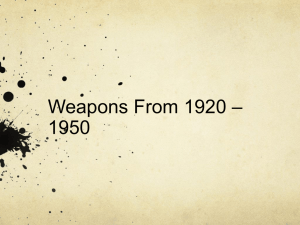Name The Dropping of the Atomic Bombs: Arguments For and
advertisement
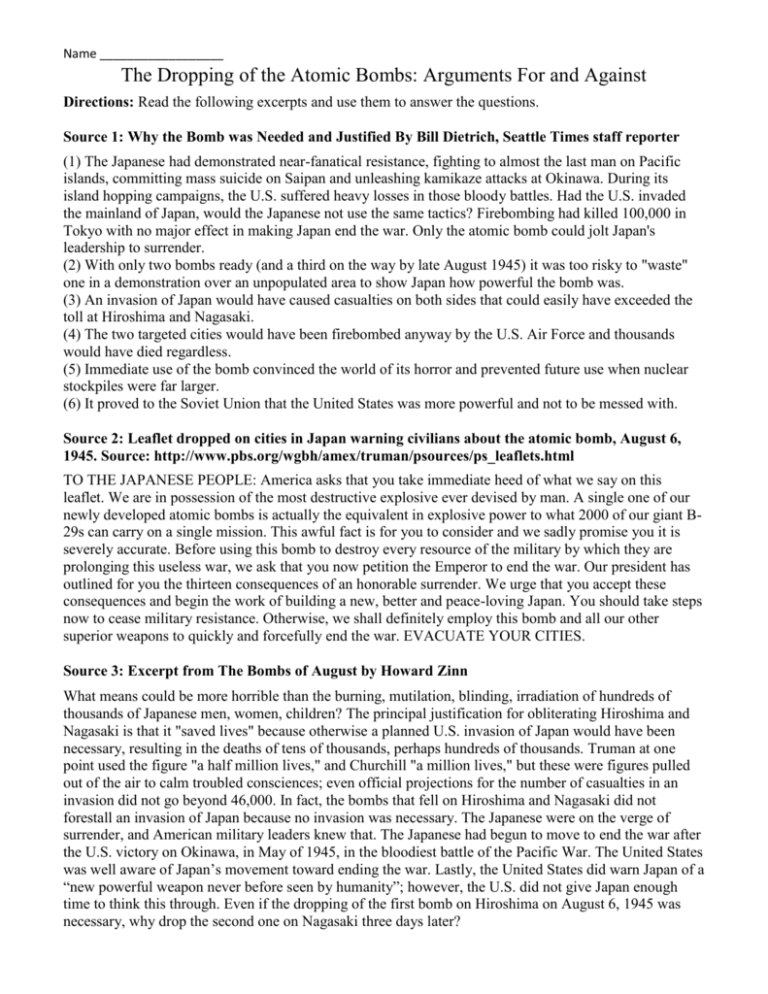
Name __________________ The Dropping of the Atomic Bombs: Arguments For and Against Directions: Read the following excerpts and use them to answer the questions. Source 1: Why the Bomb was Needed and Justified By Bill Dietrich, Seattle Times staff reporter (1) The Japanese had demonstrated near-fanatical resistance, fighting to almost the last man on Pacific islands, committing mass suicide on Saipan and unleashing kamikaze attacks at Okinawa. During its island hopping campaigns, the U.S. suffered heavy losses in those bloody battles. Had the U.S. invaded the mainland of Japan, would the Japanese not use the same tactics? Firebombing had killed 100,000 in Tokyo with no major effect in making Japan end the war. Only the atomic bomb could jolt Japan's leadership to surrender. (2) With only two bombs ready (and a third on the way by late August 1945) it was too risky to "waste" one in a demonstration over an unpopulated area to show Japan how powerful the bomb was. (3) An invasion of Japan would have caused casualties on both sides that could easily have exceeded the toll at Hiroshima and Nagasaki. (4) The two targeted cities would have been firebombed anyway by the U.S. Air Force and thousands would have died regardless. (5) Immediate use of the bomb convinced the world of its horror and prevented future use when nuclear stockpiles were far larger. (6) It proved to the Soviet Union that the United States was more powerful and not to be messed with. Source 2: Leaflet dropped on cities in Japan warning civilians about the atomic bomb, August 6, 1945. Source: http://www.pbs.org/wgbh/amex/truman/psources/ps_leaflets.html TO THE JAPANESE PEOPLE: America asks that you take immediate heed of what we say on this leaflet. We are in possession of the most destructive explosive ever devised by man. A single one of our newly developed atomic bombs is actually the equivalent in explosive power to what 2000 of our giant B29s can carry on a single mission. This awful fact is for you to consider and we sadly promise you it is severely accurate. Before using this bomb to destroy every resource of the military by which they are prolonging this useless war, we ask that you now petition the Emperor to end the war. Our president has outlined for you the thirteen consequences of an honorable surrender. We urge that you accept these consequences and begin the work of building a new, better and peace-loving Japan. You should take steps now to cease military resistance. Otherwise, we shall definitely employ this bomb and all our other superior weapons to quickly and forcefully end the war. EVACUATE YOUR CITIES. Source 3: Excerpt from The Bombs of August by Howard Zinn What means could be more horrible than the burning, mutilation, blinding, irradiation of hundreds of thousands of Japanese men, women, children? The principal justification for obliterating Hiroshima and Nagasaki is that it "saved lives" because otherwise a planned U.S. invasion of Japan would have been necessary, resulting in the deaths of tens of thousands, perhaps hundreds of thousands. Truman at one point used the figure "a half million lives," and Churchill "a million lives," but these were figures pulled out of the air to calm troubled consciences; even official projections for the number of casualties in an invasion did not go beyond 46,000. In fact, the bombs that fell on Hiroshima and Nagasaki did not forestall an invasion of Japan because no invasion was necessary. The Japanese were on the verge of surrender, and American military leaders knew that. The Japanese had begun to move to end the war after the U.S. victory on Okinawa, in May of 1945, in the bloodiest battle of the Pacific War. The United States was well aware of Japan’s movement toward ending the war. Lastly, the United States did warn Japan of a “new powerful weapon never before seen by humanity”; however, the U.S. did not give Japan enough time to think this through. Even if the dropping of the first bomb on Hiroshima on August 6, 1945 was necessary, why drop the second one on Nagasaki three days later? Name __________________ Source 4: Testimony of Kinue Tomoyasu, Hiroshima Survivor Kinue was in her home the day of the bombing. She recounts her story years later about that fateful day after the U.S. dropped the atomic bomb on her city. “Mr. Ishido [a neighbor] came up to me and said, “Quick! ...Your daughter is at the bank of the Ota River...She is alive.” ...Around Hiroshima Station, I saw more people lying dead...I couldn’t tell who was who. I kept wondering where my daughter was. But then, she cried for me, “Mother!” I recognized her voice. I found her in a horrible condition. Her face looked terrible with chunks of skin melting and peeling off her. And she still appears in my dreams like that sometimes. When I met her, she said,“There shouldn’t be any war.” ...And nine hours later, she died. ...I held her in my arms... And around early October, my hair started to come out. I wondered what was happening to me... In November, I became bald. Then, purple spots started to appear around my neck, my body and my arms,..., a lot of them, all over. I had a high fever of 103 degrees... The doctors told me it was from the radiation from the atomic bomb. I still had a fever when I was admitted here [HABV Nursing Home] for a while, but now I don’t have a fever so often. ...My son [served in the Japanese army and] ... suffered a lot. I don’t know why, but he... killed himself... I was left alone. I had to go through hardships, living alone. I have no family. Doctors turned an elementary school into a hospital to care for children who were victims of the bomb. Most children who were exposed to the radiation died. Victim suffering from radiation after the blast. Surgeons had to remove the radioactive clothing which had melted into people’s skin. Chart of Atomic Bombs: Source: http://www.ww2guide.com/atombomb.shtml Hiroshima Estimated Dead/Missing 70,000 Wounded 70,000 Nagasaki 40,000 40,000 Total Casualties 140,000 80,000 Area Destroyed 4.7 sq. miles 1.8 sq. miles
